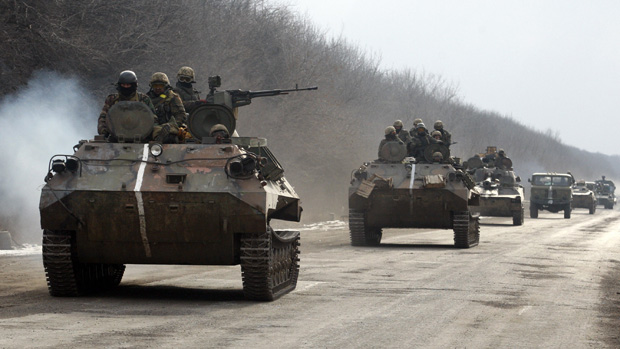Europe 'sleep-walked' into Ukraine crisis, say peers
House of Lords committee accuses UK and EU of a 'catastrophic misreading' of the mood in Russia

A free daily email with the biggest news stories of the day – and the best features from TheWeek.com
You are now subscribed
Your newsletter sign-up was successful
Europe "sleep-walked" into the current crisis in Ukraine, with member states "taken by surprise" by the unfolding conflict, the House of Lords EU committee has said.
Lord Tugendhat, chairman of the committee, said a lack of "robust analytical capacity" in both the UK and the EU effectively led to a "catastrophic misreading of the mood in the run-up to the crisis".
He raised concerns that the UK's expertise within the Foreign Office had "diminished significantly" and said the EU displayed a "worrying lack of political oversight" regarding the European Commission's trade negotiations with Ukraine in 2013.
The Week
Escape your echo chamber. Get the facts behind the news, plus analysis from multiple perspectives.

Sign up for The Week's Free Newsletters
From our morning news briefing to a weekly Good News Newsletter, get the best of The Week delivered directly to your inbox.
From our morning news briefing to a weekly Good News Newsletter, get the best of The Week delivered directly to your inbox.
"Having said that, Russia misread the Ukrainian appetite for a trade agreement with the EU," said Tugendhat. "The combination led to the crisis we have today, which neither side saw coming."
The Lords report, which looked at the cause of the Ukraine conflict and its implications, stated that the EU needs "fundamentally to reassess" its relationship with Russia.
The committee said that the UK government had "not been as active or as visible as it could have been" in seeking to resolve the crisis.
A Foreign Office spokeswoman told the BBC that nobody could have predicted the scale of the "unjustifiable and illegal" Russian intervention in eastern Ukraine and that the blame lies "squarely with the pro-Russian separatists, backed by the Russian authorities".
A free daily email with the biggest news stories of the day – and the best features from TheWeek.com
She added: "If the Ukrainian people want a closer social, economic and political relationship with the EU, that is for the people of Ukraine to decide, not Russia."
Last night, renewed rocket fire in eastern Ukraine, including around the rebel-held city of Donetsk, further undermined the ceasefire agreed in Minsk last week. General Philip Breedlove, Nato's top commander, said the ceasefire now existed in name only.
Meanwhile, RAF jets were again forced to scramble to intercept a pair of Russian long-range bombers seen off the coast of Cornwall. It came as Defence Secretary Michael Fallon warned that Russia's President Vladimir Putin posed a "real and present danger" to Latvia, Lithuania and Estonia.
-
 Local elections 2026: where are they and who is expected to win?
Local elections 2026: where are they and who is expected to win?The Explainer Labour is braced for heavy losses and U-turn on postponing some council elections hasn’t helped the party’s prospects
-
 6 of the world’s most accessible destinations
6 of the world’s most accessible destinationsThe Week Recommends Experience all of Berlin, Singapore and Sydney
-
 How the FCC’s ‘equal time’ rule works
How the FCC’s ‘equal time’ rule worksIn the Spotlight The law is at the heart of the Colbert-CBS conflict
-
 Putin’s shadow war
Putin’s shadow warFeature The Kremlin is waging a campaign of sabotage and subversion against Ukraine’s allies in the West
-
 Epstein files topple law CEO, roil UK government
Epstein files topple law CEO, roil UK governmentSpeed Read Peter Mandelson, Britain’s former ambassador to the US, is caught up in the scandal
-
 Iran and US prepare to meet after skirmishes
Iran and US prepare to meet after skirmishesSpeed Read The incident comes amid heightened tensions in the Middle East
-
 Israel retrieves final hostage’s body from Gaza
Israel retrieves final hostage’s body from GazaSpeed Read The 24-year-old police officer was killed during the initial Hamas attack
-
 China’s Xi targets top general in growing purge
China’s Xi targets top general in growing purgeSpeed Read Zhang Youxia is being investigated over ‘grave violations’ of the law
-
 Panama and Canada are negotiating over a crucial copper mine
Panama and Canada are negotiating over a crucial copper mineIn the Spotlight Panama is set to make a final decision on the mine this summer
-
 The rise of the spymaster: a ‘tectonic shift’ in Ukraine’s politics
The rise of the spymaster: a ‘tectonic shift’ in Ukraine’s politicsIn the Spotlight President Zelenskyy’s new chief of staff, former head of military intelligence Kyrylo Budanov, is widely viewed as a potential successor
-
 Why Greenland’s natural resources are nearly impossible to mine
Why Greenland’s natural resources are nearly impossible to mineThe Explainer The country’s natural landscape makes the task extremely difficult